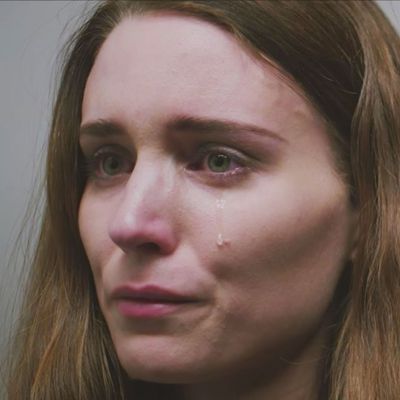
Una’s title card comes up during its loudest (and to my memory, only) music cue: PJ Harvey’s “Down by the Water,” a song that starts at about 95 on the intensity scale and doesn’t back down from there. It hangs in all-caps letters over the titular character at age 13, in a video testimony for the trial of the man who kidnapped and abused her; the letters then hang over her at age 29, as played by Rooney Mara, sitting in her car before confronting the same man at his place of employment. Harvey’s words – “That blue-eyed girl became blue-eyed whore” — are every bit as searing as the film that follows, but also strangely misleading. Una is not so much about the transformation of its title character as it is a bracing but static wail.
As an adult, Una works a dead-end job by day and seeks out anonymous sex in clubs by night. She still lives with her parents, on the same suburban block where her affair with Ray (Ben Mendelsohn) began 15 years earlier. We see snapshots of it in flashback throughout the film, but the present-day action starts when Una sets out to confront Ray, having found a photo of him at his workplace, some kind of anonymous manufacturing plant. When she arrives at the facility, she promptly vomits in some bushes en route to the entrance. This doesn’t bode well for how well she’ll handle actually being face-to-face with Ray, nor does it bode well for our stomachs throughout their tête-à-tête. The two have it out, first in the office break room, and Una’s opening argument — that he ruined her life — soon morphs into something even more vulnerable: the betrayal she felt after he abandoned her during their illicit getaway. In the midst of all this, Ray finds himself targeted by his co-workers (including Riz Ahmed, in a rather thankless role), and as the professional life he’s been defending from the dark secret in his past seems to be imploding, both she and he once again flirt with throwing caution to the wind.
The film is written by David Harrower, adapted from his acclaimed 2005 play Blackbird, which recently had a Broadway revival starring Jeff Daniels and Michelle Williams. I have not seen the play, but like many stage adaptations, the film suffers from a slightly empty feeling when it veers to scenes that were not a part of its original text. To a degree, this is to be expected, but Una’s dramatic spine — the raw-nerve exchange between Una and Ray — also comes off as disjointed and edited within an inch of its life, thanks largely to director Benedict Andrews’s restless need to send the characters running around to different rooms in the facility, and an overreliance on flashbacks.
To be clear, it is these flashbacks, with their queasily typical Lolita imagery, that are the most problematic; aside from their depiction of a pivotal plot development, they feel excessively literal, looking at young Una rather than through her, never elucidating the young girl’s infatuation with her abuser, keeping it a spectacle. A great film, and I suspect Harrower’s play, would be able to convey the weight and trauma of what happened between Una and Ray from the way that they speak to each other in the present alone. As Ray, Mendelsohn is the phrase “tail between the legs” personified, a hunched shrug of a man who we can imagine is always on the defensive even before Una walks back into his life. It’s easy to imagine the combustible energy in their exchange in a theater setting, where there’s nowhere else to cut to, even less of an escape from the high anxiety. Here the options of filmmaking both dilute and increase the stress of the viewing experience.
But Mara’s performance also feels like a lost opportunity, opaque and filled with blank stares in the manner she’s taken to in her last few film roles — either of her own accord of because her directors are at a loss with what to do with her striking cheekbones and saucer eyes. She takes on a British accent for the role, which she pulls off capably enough, but there’s a wall between us and Una that can’t be there if we are to understand this story as anything other than a ripped-from-the-headlines gawkfest. It made me long for when filmmakers used to make Mara talk not so long ago, particularly Steven Soderbergh for 2013’s Side Effects, or even her breakout turn in The Social Network. To be fair, Una talks a lot, and in particularly frank detail when discussing her recollection of events and the fallout from them, but there’s no sense of momentum to Mara’s performance, even the dysfunctional variety. When she and Mendelsohn tear apart the break room in what’s meant to be a cathartic display, it feels telegraphed from some other version of this story. Mara and this story both deserve better.

